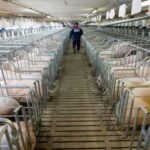Arizona Takes a Stand: The Push to Outlaw Lab-Grown Meat Echoes Italy’s Bold Move
In a rapidly evolving food landscape, where innovation and technology seek to redefine what lands on our dinner plates, the emergence of lab-grown meat has sparked both intrigue and controversy. This novel approach to meat production, promising a future of meat without the slaughter, stands at the forefront of food technology’s most polarizing debates. Yet, as the tide of technological progress swells, not everyone is ready to ride the wave.
Recently, Arizona has positioned itself as a battleground in this debate, with legislative maneuvers that echo a broader global resistance to lab-grown meat. This development marks a significant moment in the ongoing discourse about the future of food, inviting us to ponder the implications of these scientific advancements on our health, environment, and the very fabric of our societies.
The controversy is not just about the science of cultivating meat in labs; it delves deep into the realms of ethics, tradition, and economic implications. Arizona’s legislative pushback, aligning it with countries like Italy, reflects a growing skepticism towards lab-grown meat. These legislative efforts highlight a critical juncture in our journey towards sustainable food systems, questioning the balance between innovation and tradition, between the allure of a high-tech future and the preservation of time-honored ways of life.
As we peel back the layers of this complex issue, it’s essential to navigate the discussion with an open mind yet a critical eye. The dialogue around lab-grown meat is not merely a matter of taste or technology but a profound exploration of our values, our priorities, and the kind of world we wish to inhabit.
This article aims to shed light on Arizona’s stance, explore the broader implications of lab-grown meat, and offer guidance to those navigating this controversial market. Through a critical examination of the lab-grown meat industry and its opposition, we’ll delve into the heart of a debate that challenges us to rethink the future of food.
Arizona’s Legislative Stand Against Lab-Grown Meat
In a decisive move that reflects a growing skepticism toward the lab-grown meat industry, Arizona has introduced two pivotal bills, HB2121 and HB2244, marking a significant stance against the production and sale of cell-cultured animal products within its borders. Spearheaded by State Rep. David Marshall of Snowflake, along with four co-sponsors, HB2121 emerges as a bold legislative effort to prohibit the offering, sale, or production of cell-cultured animal products aimed at human consumption in Arizona. The bill outlines stringent penalties for those who dare to cross this legislative line, authorizing the state to impose civil penalties up to $25,000, alongside attorney fees, costs, and total actual damages not exceeding $100,000.
Complementing HB2121’s broad prohibitions, HB2244, sponsored by Rep. Huang Nguyen of Prescott Valley, targets the potential deception in the marketing of lab-grown meats. This bill specifically outlaws the intentional misrepresentation of non-traditional meat products as being derived from traditional livestock or poultry, safeguarding consumers from confusion and ensuring the integrity of meat labeling.
These legislative actions are not mere legal formalities; they are a clear expression of Arizona’s commitment to protecting its consumers, preserving its agricultural heritage, and upholding the standards of food safety and transparency. By drawing a hard line in the sand, Arizona joins a global conversation on the ethics, environmental implications, and economic impacts of lab-grown meat, signaling a broader resistance to a technology that, while innovative, raises profound questions about the future of food production, cultural traditions, and the ecological balance of our planet.
The introduction of HB2121 and HB2244 into the Arizona Legislature signifies more than a regional regulatory adjustment; it is a statement of values and priorities. It underscores the importance of cautious deliberation in the face of sweeping technological changes, emphasizing that innovation must not only be measured by its scientific feasibility but also by its alignment with societal values, ethical considerations, and long-term sustainability goals.
Why Arizona is Pushing Back
Arizona’s legislative foray against lab-grown meat is rooted in a multifaceted rationale that intertwines public health concerns, economic interests, cultural heritage, and ethical considerations. The state’s decision to introduce bills HB2121 and HB2244 reflects a deep-seated conviction to safeguard its citizens and uphold its traditions against the tide of lab-grown meat innovations. Let’s uncover the core reasons behind Arizona’s legislative pushback, highlighting the complexities and stakes involved.
Protecting Public Health
One of the primary motivations cited for the stringent regulation of lab-grown meat is the protection of public health. Proponents of the bills argue that the nascent technology behind cell-cultured animal products still harbors unknowns, particularly regarding long-term health impacts. Arizona’s stance is precautionary, favoring a thorough vetting process to ensure that any new food product, especially those created in laboratories, meets the highest safety standards before reaching consumers.
Preserving Traditional Agriculture
Arizona’s economy and cultural identity are deeply intertwined with its cattle ranching industry, a sector that has been a cornerstone of its history and development. The legislation implicitly recognizes the value of traditional agriculture, emphasizing the importance of supporting local ranchers and protecting an industry that has been integral to the state’s economy and way of life. By pushing back against lab-grown meat, Arizona is making a conscious effort to preserve its agricultural heritage and support the livelihoods of its farming communities.
Economic and Environmental Concerns
The introduction of lab-grown meat poses potential economic threats to traditional ranchers and farmers, who risk being undercut by cell-cultured alternatives that could eventually become cheaper and more accessible. Moreover, there are concerns about the environmental claims of lab-grown meat proponents. Critics argue that the energy-intensive production processes required for cultivating meat in labs could offset any purported environmental benefits, such as reduced land use and greenhouse gas emissions.
Ethical and Cultural Dimensions
Finally, Arizona’s legislative actions touch upon deeper ethical and cultural dimensions. There’s a prevailing belief that food is more than just sustenance; it’s a reflection of a community’s values, history, and traditions. The move to regulate lab-grown meat is partly a defense of these values, challenging the notion that technological progress should override ethical considerations and cultural practices related to food production and consumption.
Arizona’s pushback against lab-grown meat is a complex tapestry woven from concerns about health, economy, environment, ethics, and culture. The state’s legislative measures are a manifestation of a broader debate on how society chooses to navigate the intersection of technology, food, and ethics. Arizona’s stance is a call for a more cautious, reflective approach to food innovation, one that respects the past and present while cautiously stepping into the future.
Critique of the Lab-Grown Meat Industry
The burgeoning lab-grown meat industry, while celebrated by some as a breakthrough, faces a barrage of criticism over its ethical, environmental, and economic implications. Arizona’s legislative actions against this industry underscore a broader, critical discourse that challenges the unchecked enthusiasm surrounding cell-cultured meat products. This critique not only raises questions about the industry’s claims but also calls for a more nuanced understanding of the potential consequences of replacing traditional meat with lab-grown alternatives.
Ethical Implications
The ethical debate surrounding lab-grown meat is multifaceted, touching on animal welfare, human health, and the nature of food itself. Critics argue that while lab-grown meat proposes to reduce animal suffering by eliminating the need for livestock slaughter, it still involves the use of animal cells and raises questions about the manipulation of life forms for human consumption. Moreover, the long-term health impacts of consuming cell-cultured meat remain uncertain, prompting concerns over whether the pursuit of technological innovation in food production adequately considers the welfare of consumers.
Environmental Concerns
Proponents of lab-grown meat tout its potential to significantly reduce the environmental footprint of traditional meat production, citing decreased land use, water consumption, and greenhouse gas emissions. However, critics counter these claims by pointing to the substantial energy requirements of culturing meat in labs. The process demands constant temperature control, sterile environments, and extensive resources to cultivate and harvest animal cells, leading to questions about the overall sustainability of lab-grown meat compared to improvements in traditional farming practices and alternative protein sources.
Economic Impact
The economic critique of the lab-grown meat industry focuses on its potential to disrupt traditional agriculture and livestock farming, sectors that are vital to the livelihoods of millions globally. There’s a fear that as lab-grown meat becomes more affordable and accessible, it could undermine rural economies, leading to job losses and the erosion of communities built around traditional farming. Moreover, the industry’s reliance on high-tech laboratories and specialized knowledge may concentrate wealth and control in the hands of a few corporations, exacerbating inequality within the food system.
Questioning Industry Promises
The lab-grown meat industry’s bold claims of revolutionizing food production and solving pressing global issues like climate change and food security are met with skepticism. Critics urge a closer examination of these promises, challenging the narrative that technological innovation alone can address complex societal challenges. There’s a call for a more holistic approach to food sustainability that incorporates ethical farming practices, reduction of food waste, and dietary changes, rather than relying solely on lab-grown alternatives.
The critique of the lab-grown meat industry in the USA reflects deep-seated concerns about the direction of food innovation and its implications for society. Arizona’s legislative pushback serves as a focal point for these broader debates, highlighting the need for careful consideration of the ethical, environmental, and economic dimensions of introducing lab-grown meat into the market. As the industry continues to evolve, it remains imperative to engage in critical dialogue that prioritizes public health, environmental sustainability, and social equity.
Global Resistance to Lab-Grown Meat
Arizona’s legislative measures against lab-grown meat are not an isolated phenomenon but part of a growing global trend of resistance to this new form of meat production. Countries and regions are grappling with the implications of introducing cell-cultured meat into their food systems, each taking different stances based on their unique cultural, economic, and regulatory landscapes.
Here we’ll explore the international context of the debate over lab-grown meat, highlighting notable examples of resistance and regulation.
Italy’s Ban on Cultivated Meat
Italy stands out as a prominent example of a country that has taken definitive action against lab-grown meat. The Italian Parliament’s decision to ban the production of cultivated meat is rooted in a desire to protect its rich culinary heritage and the traditional farming practices that are integral to its culture. Italian lawmakers, echoing sentiments similar to those in Arizona, have expressed concerns about the social and economic risks of synthetic food, prioritizing the preservation of traditional food sources and the agricultural sector that supports them.
European Food Safety Authority (EFSA) Caution
While not an outright ban, the European Food Safety Authority’s cautious approach to lab-grown meat highlights the regulatory challenges facing the industry in Europe. The EFSA requires that any cell-cultured meat product undergo a rigorous novel food review process before it can be approved for sale. This stringent regulatory framework reflects a broader European emphasis on food safety, consumer protection, and environmental sustainability, underscoring the continent’s careful consideration of the implications of lab-grown meat.
Regulatory Landscape in the United States
The United States presents a contrasting picture, with the USDA’s Food Safety and Inspection Service (FSIS) and the FDA jointly agreeing to regulate lab-grown meat for safety. Since 2022, both agencies have approved applications for lab-grown products, signaling a more open stance towards the industry compared to Arizona’s prohibitive measures. This divergence within the United States illustrates the complex interplay between federal regulations and state-level initiatives, highlighting the varied perspectives and interests at play.
The Global Debate
The global resistance to lab-grown meat underscores a broader debate about the future of food, technology’s role in society, and the preservation of cultural and culinary traditions. Countries and regions are navigating these issues in diverse ways, balancing the potential benefits of lab-grown meat—such as reduced environmental impact and animal welfare—with concerns about public health, economic implications, and ethical considerations.
As the lab-grown meat industry continues to evolve, the international response to it will likely remain varied, reflecting the multifaceted nature of food as a subject that intersects with health, environment, economy, and culture. The resistance seen in places like Arizona and Italy serves as a reminder of the complex, often deeply personal considerations that inform our choices about what we eat and the systems we support through those choices.
Consumer Guidance: Navigating a Controversial Market
As the debate over lab-grown meat intensifies, consumers find themselves at a crossroads, faced with making informed choices in a landscape marked by innovation, controversy, and legislative battles.
Here we offer practical advice for those looking to navigate the complexities of the lab-grown meat market, emphasizing the importance of critical thinking, ethical considerations, and the impact of consumer choices on the broader food system.
Understanding Labels and Regulations
Read Labels Carefully: With the introduction of lab-grown meat products into the market, it becomes crucial for consumers to read labels attentively. Look for clear indications of the source of the meat, whether it is cell-cultured or traditionally farmed, to make informed decisions based on your preferences and values.
Stay Informed About Regulations: Keep abreast of the latest regulations and standards pertaining to lab-grown meat. Regulatory bodies in different regions may have varying definitions and labeling requirements for these products, affecting how they are presented to consumers.
Ethical and Environmental Considerations
Consider the Ethical Implications: Reflect on the ethical dimensions of lab-grown meat, including animal welfare, environmental sustainability, and the socio-economic impact on traditional farming communities. These considerations can help guide your choices towards more conscious and responsible consumption.
Evaluate Environmental Claims: Investigate the environmental claims made by lab-grown meat companies. While touted as a more sustainable option, it’s important to critically assess these assertions, considering factors like energy consumption and the overall carbon footprint of lab production processes.
Supporting Traditional and Sustainable Alternatives
Explore Traditional and Plant-Based Alternatives: If lab-grown meat raises concerns for you, consider supporting traditional farming practices that prioritize animal welfare and environmental sustainability, or explore the growing range of plant-based meat alternatives that offer minimal impact on the environment and animal welfare.
Advocate for Transparency and Sustainability: As a consumer, your voice matters. Advocate for greater transparency in the food industry, including clear labeling of lab-grown meat products, and support initiatives that promote sustainability and ethical practices in food production.
Staying Informed and Engaged
Educate Yourself and Others: Stay informed about the developments in the lab-grown meat industry and the ongoing debates surrounding it. Education is a powerful tool for making choices that align with your values and for engaging in meaningful discussions about the future of food.
Participate in Public Discourse: Engage in the public discourse on lab-grown meat by participating in community discussions, and online forums, or by contacting your representatives to express your views. Active participation can influence policy decisions and contribute to shaping a food system that reflects collective values and priorities.
Navigating the controversial market of lab-grown meat requires consumers to be well-informed, reflective, and proactive in their choices. By considering the broader implications of these new food technologies, individuals can contribute to a food system that is ethical, sustainable, and aligned with their values. As the landscape of food production continues to evolve, the power of informed consumer choice remains a critical force in shaping the future of our food system.
Forging the Future of Food
The emergence of lab-grown meat has sparked a multifaceted debate that touches upon the very essence of what it means to consume and produce food in the 21st century. Arizona’s legislative pushback against this nascent industry, alongside global resistance exemplified by countries like Italy, underscores the complexities and controversies surrounding food innovation. These actions highlight not only the technological and scientific challenges of introducing lab-grown meat into our diets but also the profound ethical, environmental, and socio-economic implications that accompany such a shift.
As we stand at the crossroads of tradition and innovation, the discourse surrounding lab-grown meat invites us to critically examine our values and priorities when it comes to food production and consumption. It challenges us to consider the impact of our choices on public health, the environment, and the livelihoods of those who have fed generations through traditional farming practices. The debate is not merely about the feasibility or safety of lab-grown meat but about the kind of future we envision for our planet and ourselves.
In navigating this controversial market, consumers play a pivotal role. Armed with information and a critical perspective, individuals have the power to influence the direction of food innovation and advocate for a food system that respects ethical considerations, promotes sustainability, and upholds cultural and culinary traditions. The choices we make at the grocery store, the questions we ask, and the values we champion can collectively shape the trajectory of food technology and its place in our lives.
As the conversation around lab-grown meat continues to evolve, it is imperative that it remains inclusive, reflective, and grounded in a holistic understanding of the implications of such technological advancements. By fostering a dialogue that encompasses the voices of scientists, farmers, consumers, and policymakers, we can navigate the complexities of this issue and work towards solutions that balance innovation with integrity, sustainability, and respect for the rich tapestry of food traditions that define our shared humanity.
The path forward is not without its challenges, but by approaching the future of food with curiosity, caution, and compassion, we can ensure that the next chapter in our culinary story is one that honors both the past and the potential of what lies ahead.
The post Arizona Takes a Stand: The Push to Outlaw Lab-Grown Meat Echoes Italy’s Bold Move appeared first on Healthy Holistic Living.











